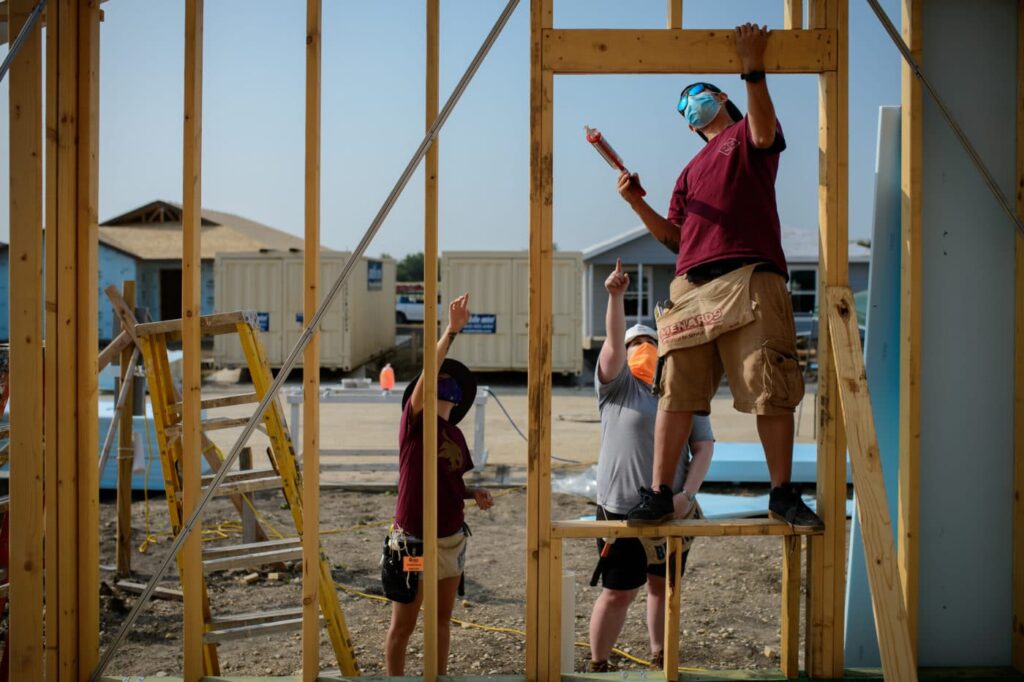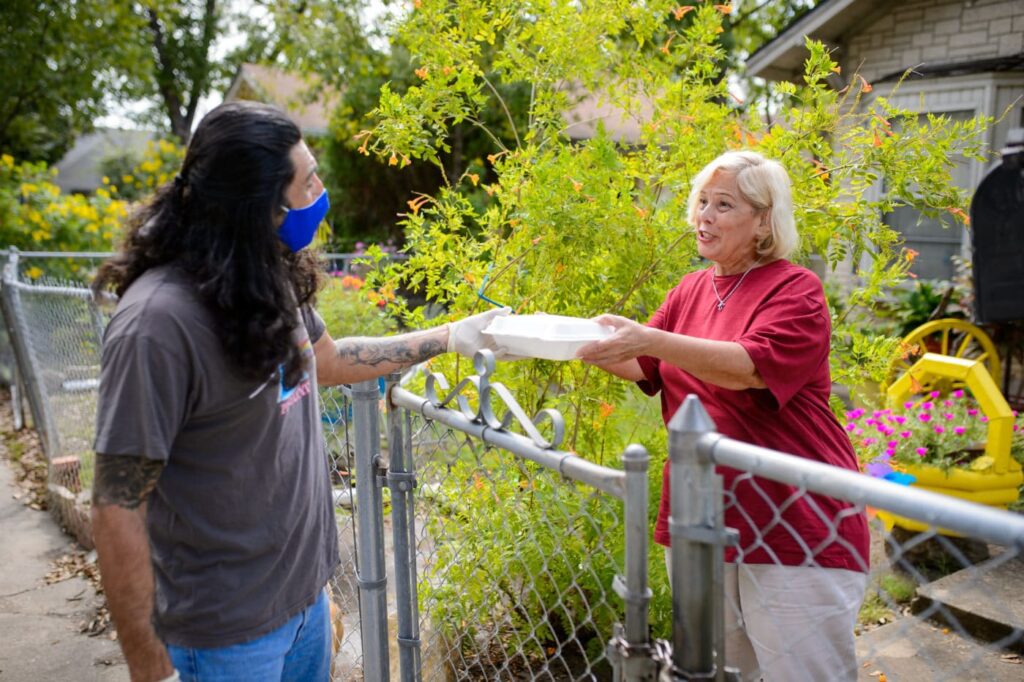As time went by and with no relief in sight, Ben Tremillo began realizing what all that talk about the new normal he was hearing everywhere was all about.
Weeks turned into months and the doors to the venerable artistic hub on San Antonio’s West Side known as San Anto Cultural Arts remain shuttered due to the relentless havoc COVID-19 has continued wreaking on our community.
“The bottom line is we have had to find creative ways to continue our work with resources we have,” said Ben Tremillo, San Anto’s executive director. “We have always been a small organization working with a limited budget – only now we are working without a roadmap toward an unpredictable destination.”
Picture dozens of Tremillo’s peers at many other local nonprofits nodding in unison. Just like him, nonprofit leaders have had no choice but to shift gears quickly due to the lingering impact of the pandemic in order to be able to keep serving their constituents and clients, many of whom live at or even below the poverty line.

For many such organizations, the situation became so dire that it turned into a real-life struggle to simply stay afloat and not close up shop for good.
Identifying the dire need to immediately help those helping others, the San Antonio Area Foundation teamed up with the United Way of San Antonio & Bexar County to create the COVID-19 Response Fund in March 2020.
In just a few months, the fund – along with gracious direct donor contributions – raised and distributed more than $13 million, giving a boost to 200 local nonprofits feeling the wrath of the coronavirus.
Those grants proved tremendously timely and helpful, but it was sheer resilience and innovation that truly empowered so many nonprofits to find ways to keep thriving under such difficult circumstances. There was no time to stand idle. They had to pivot.
Shifting Focus
Tremillo at San Anto Cultural Arts said their office has remained close to the public and staff continued to work remotely. They have found ways to keep most major projects going, thanks in part to a grant from the COVID-19 Response Fund.
For example, for the youth program, staff created 30 art class instruction videos posted on San Anto’s Facebook page and YouTube channel, while the afterschool program continues on Zoom.
San Anto’s printed newspaper, El Placazo, has now become a podcast. Given the restriction on large public gatherings, the well-known mural project has been the toughest to maintain. Some restoration work not requiring many volunteers took place and there’s a video art project in the works to give artists a voice – once completed, it’ll be available for free online.
“San Antonio will be there for our community as best we can – then, now and always,” Tremillo proudly affirmed.
Corazon Ministries has been serving downtown San Antonio’s homeless population for more than two decades. The pandemic had an immediate impact on its homelessness service work since those being served could no longer congregate in large groups.
No longer able to keep playing host, the agency went mobile, said Michael Pursley, interim executive director at the time. Staffers used an “ice cream truck model” to visit the five largest public parks in the downtown area to distribute meals. But there still needed to be some kind of central hub, so Corazon teamed up with Centro SA and the City of San Antonio to use a gymnasium with established social distancing and safety protocols.
The demand only increased over time and Corazon was able to hire a kitchen assistant to help prepare more meals. In all, services increased from four to seven days a week with the average weekly meal count doubling from 420 to 840. Since the pandemic hit, more than 21,000 meals have been served.
Pursley also noted that additional services for people experiencing homelessness have been provided at the hub, such as ID recovery, a cooling center during hot summer weekdays, voter registration and medical services. Such work is crucial in order to keep the poverty rate from increasing in our community.
Century Strong
If Corazon has been a leading homeless caretaking operation in the downtown area for two decades, the House of Neighborly Service (HNS) has basically doubled as second home for dozens upon dozens of West Side families for literally more than a century.
The social service agency offers various programs that improve clients’ standard of living – a steadfast staple has been hosting meal services for older adults like Estela Trujillo.
But with the pandemic forcing the agency to close its doors, suddenly Trujillo and many of her elder neighbors faced having to skip meals since they’ve always counted on HNS.

“I’m so grateful to be able to have their help,” said Trujillo, who still gets her meals – only now, they’re delivered to her home since the office is closed and many elders like her have feared venturing out since they’re the primary demographic target of the virus.
Sandra Morales, Executive Director of House of Neighborly Service, said the COVID-19 Response Fund grant allowed the agency to go mobile and expand its network of drivers for meal deliveries.
Additionally, its afterschool program had to be tweaked – most kids come from low-income homes and in many cases one or both breadwinners suddenly were out of work.
Thus, program funds had to go toward covering basics including food, clothing and help with bills.
Had it not been for the response fund grant, Morales said around 100 older adults and 25 afterschool program families would not have received assistance and thus its effort to reduce poverty would’ve been severely hampered.
“Everything was going great until COVID hit our community,” said Morales. “(The grant) made a huge impact – a godsend. It was the catalyst we needed to pivot really quickly.”
Back To Basics
Immigrant families could be seen as potentially the most marginalized in our community and whose income many times falls under the poverty threshold. To many if not most folks, they tend to be an invisible population. Yet they add to the unique diversity and cultural strength of San Antonio. Some of us may not know it, but they’re our neighbors and they, too, have been deeply impacted by the pandemic.
Immigrants don’t typically go around asking for help – for better or worse, they’re used to fending for themselves. Yet like most of us, they could not prepare for what the pandemic would bring, particularly in terms of helping their school-aged children.
Many immigrant parents in San Antonio have been able to count on nonprofit IMMSCHOOLS for support. The organization advocates for them inside schools, educating teachers and administrators on how to best help immigrant students and their families.
Yet with schools at first fully closed for weeks and with many students still participating virtually from home, IMMSCHOOLS lost contracts with districts and was forced back to the drawing board to retool its approach.
Just as with House of Neighborly Service’s afterschool program, IMMSCHOOLS was able to put its COVID-19 Response Fund grant to good use by helping immigrant families, who typically experience income inequality, cover basic needs such as rent and groceries.
“Without those funds, we wouldn’t have been able to help our families,” said Viridiana Carrizales, co-founder and CEO of IMMSCHOOLS. “The effort will stay with me forever to help me remember that we were able to quickly mobilize to support the community.”
What all these and countless other nonprofit organizations in the San Antonio area have in common is the connective tissue of resiliency and innovation – in a time of crisis, no less.
Faced with unprecedented and dire obstacles brought on by a global pandemic, they didn’t sit idle. They didn’t throw their arms up in the air in despair. They didn’t panic. They took a deep breath and got to work – just like they’ve always done.
It has never been about them but about the people they serve – our hardworking yet vulnerable neighbors needing a hand to get back on their feet. The pandemic is relenting and unfortunately, it’s still with us – so will an army of dedicated, quick-on-their-feet nonprofits standing ready to serve, no matter the obstacle ahead.
Click here to learn how the San Antonio Area Foundation has been making an impact in the community since 1964.


Our hearts are with the Kerrville community following the devastating flooding.
Please consider making a donation to help our neighbors rebuild by clicking here.